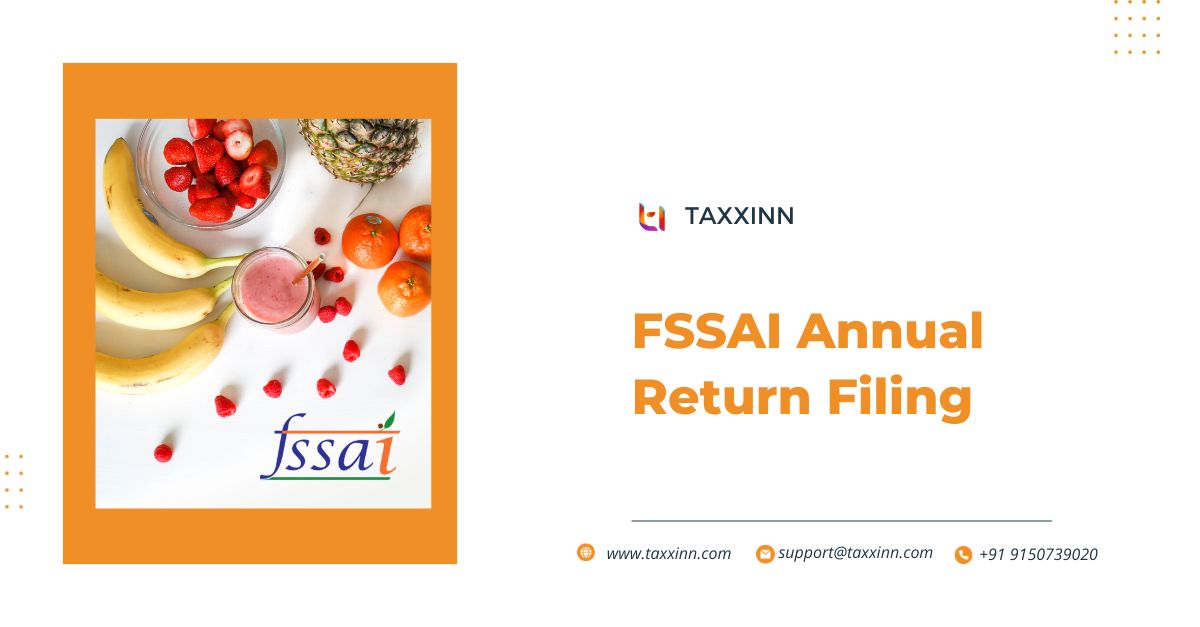The Food Safety and Standards (FSS) Act of 2006 was enacted to regulate the Indian food industry. The responsibility of enforcing the FSS Act lies with the Food Safety and Standards Authority of India (FSSAI). Food Business Operators (FBOs) must obtain recognition or a licence from the FSSAI. According to the guidelines set forth by FSSAI, every food-related company with an FSSAI licence should submit an annual return. This requirement applies to each licence obtained, even if a Food Business Operator holds multiple licences. This blog will take you through the FSSAI return filing procedure, types, documents and many more.
Upon obtaining FSSAI registration or a licence, FBOs are mandated to submit their FSSAI annual return and adhere to all FSSAI compliances. Failure to submit their annual returns within the stipulated timeframe may result in penalties for FBOs.
FSSAI Annual Return: What Is It?
- After obtaining an FSSAI Registration or Licence each year, Food Business Operators (FBOs) are obliged to submit an annual FSSAI Return, commonly referred to as an FSSAI Return.
- FBOs must submit their FSSAI Annual Return to avoid incurring a severe penalty.
- In certain circumstances, the FSSAI Registration Certificate may be considered invalid if FSSAI Returns are not filed or if the FBO does not adhere to FSSAI compliances, which would necessitate paying late fees to submit a renewal application.
- FBOs must submit the FSSAI Annual Return, a form available both online and offline, before the specified deadline.
NOTE:
To improve compliance and streamline reporting, the format of the Annual Return for food companies has been modified. The new format indicates a comprehensive evaluation of the company’s operations and adherence to food safety rules.
Advantages of the Annual Return’s Revised Format
- The food industry is exempt from maintaining physical records and receipts.
- Food business operators (FBOs) are protected from inadvertent fines.
- Digital reminders will be sent for annual return filing. The data will eventually be accessible for review by the country or state.
Currently, every assessment relies on the information submitted by food businesses during the licensing application process, etc. Before this, updated information has not been readily available.
Previous Format for Fssai Annual Return
As per the Food Safety and Standards (Licensing and Registration) Regulations of 2011, it’s a requirement for food enterprises holding an FSSAI licence to complete FSSAI returns.
Types of FSSAI Return Filing
These FSSAI returns are primarily categorised into two types:
FSSAI Form D1
The FSSAI Form D1 must be submitted by all food manufacturers, importers, labellers, re-labellers, packers, and re-packers, either electronically or manually. Depending on the types of food products the Food Business Operator (FBO) dealt with in the previous financial year, Form D1 of the FSSAI annual return must be filed with the licensing authority on or before May 31 of each financial year, reflecting the variety of food products the FBO was involved with during the preceding financial year.
FSSAI Form D2
Regarding FSSAI Form D2, not every owner of a food business is obliged to submit it, as it is required every six months. Instead, this form is necessary for individuals holding an FSSAI licence engaged in the production or import of milk and milk products. A copy of Form D2 for the FSSAI annual return must be submitted every six months. The deadlines for submitting FSSAI returns in India are on or before September 30 and March 30 of each financial year.
Who Needs to File FSSAI Returns?
- Every Food Business Operator (FBO) generates at least Rs. 12 lakhs in annual revenue through commercial activities.
- Each FBO handles or transports various food commodities, whether they purchase, produce, sell, ship, distribute, or store them.
- FBOs engaged in the milk delivery and production sectors must file annual returns.
Exemption Businesses from Filing Returns
The following businesses are exempt from filing the FSSAI annual return due to the declaration of exemption by FSSAI:
- Fast food outlets
- Restaurants
- Grocery shops
- Canteens
FSSAI Annual Return Penalty
The penalty for failing to complete FSSAI returns is under Section 2.1.13 (3) of the FSS (Licensing and Registration) Regulations, 2011[1]. Food Business Operators (FBOs) who miss the deadline for submitting their FSSAI returns will incur a daily fine or penalty of Rs. 100 until the return is filed.
FSSAI Return Filing Procedure
- FBOs can submit their FSSAI returns either offline or online by using forms D1 and D2. They can access Taxxinn or the FoSCoS website to complete and submit the relevant forms for online FSSAI return filing.
- Download form D1/form D2 from the website after reviewing the Rules and Regulations.
- Complete all sections on the application form.
- The relevant food licensing organisation in their specific region can receive the completed form from FBOs after they have filled it out and sent it through their registered mail ID.
- Ensure that the information provided in the FSSAI licence aligns with the data presented in the FSSAI returns.
- FBOs should update their FSSAI licence accordingly if they identify any disparities in the data necessary for filing an FSSAI return.
Document Required for Filing FSSAI Return
Depending on the filing requirements and the company’s operations, various documents might be necessary for filing the FSSAI Return. However, the fundamental prerequisite for submitting an FSSAI Return includes:
- The name of the food item.
- FSSAI Licence Information.
- Quantity in Metric Tonnes.
- The names of countries to which food products are exported, along with the value of the food product sold, are indicated per kilogram or unit of packaging.
- The rate per kilo or per unit of packing CIF/FOB.
- Previously filed FSSAI Returns.
Information Needed for Filing FSSAI Annual Return
When completing the FSSAI Annual Return, the Food Business Operator (FBO) is required to furnish the following information:
- The count of employed Food Handlers.
- The number of Food Safety Supervisors.
- The quantity of FoSTac Trained Personnel.
- The total inspections carried out.
- Any modifications in the Layout Plan, Recall Plan, or FSMS Plan.
- Particulars regarding Consumer Grievance Handling.
- KOB-specific Data.
- Information about Manufacturers/Processors.
- Details of Importers.
Once these details are compiled, the FBO can electronically submit them to the applicable licensing authority within their jurisdiction. To find the contact information for the licensing authority, you can visit the official FSSAI website.
FSSAI Annual Return Due Date
Every financial year, Food Business Operators (FBOs) must submit FSSAI Form D1 to the government for approval by May 31st.
The due date for submitting the FSSAI Annual Return for the FBOs involved in the production of milk and milk products is obligated to submit FSSAI Form D2 every six months. These submissions are required for the time frames ranging from April 1st to September 30th and from October 1st to March 31st of each financial year.
Conclusion
Every business involved in selling, producing, importing, or exporting food commodities must complete an annual FSSAI return in India. Businesses that produce goods are obligated to submit FSSAI Form D1, while those engaged in distributing milk and milk-related products are required to submit FSSAI Form D2. You can file it by following the FSSAI return filing procedure mentioned above or reach out to Taxxinn, we will assist you in filing your FSSAI return with ease.
Related Reads,
FSSAI Licence Renewal Process.
Modification of FSSAI Licence.
List of Licences and Registrations Required for Hotel Business?


